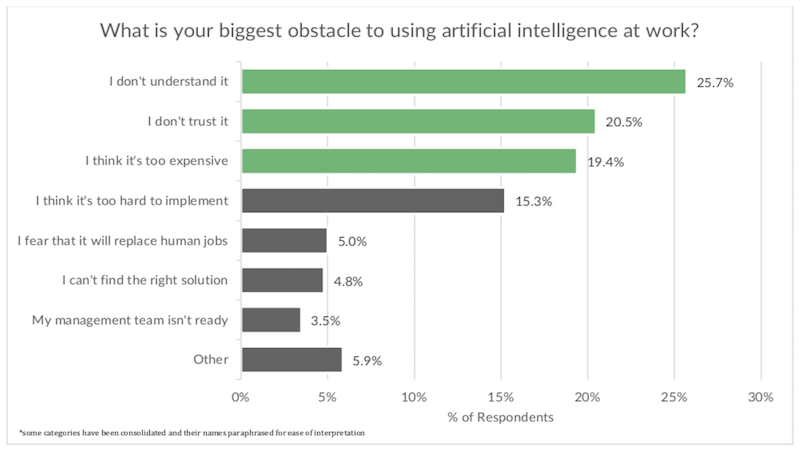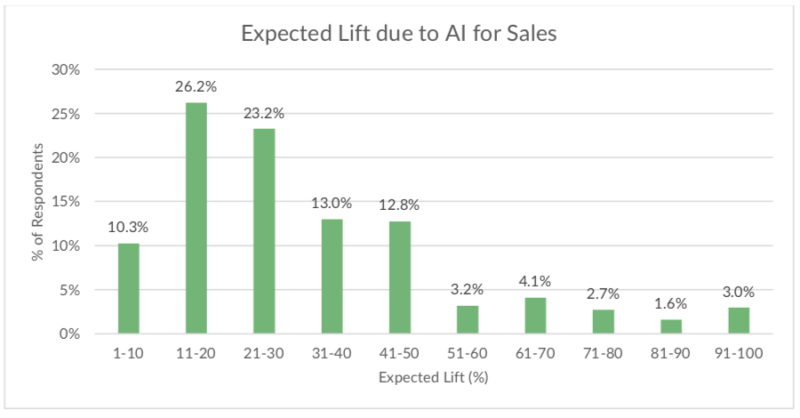InsideSales’ new study: AI is ‘becoming a way of life’ for sales
Nearly three-quarters of surveyed sales pros in the U.S. are now using some kind of AI at work, twice the rate of last year’s report.
“AI is becoming more than just mainstream,” says a new study from sales acceleration platform InsideSales.com. “It’s becoming a way of life.”
Out today, “State of Artificial Intelligence for Sales & Marketing/2018 Report” (free, registration required) shows “most people in the industry understand that AI truly enhances a sales rep’s role and makes it more efficient,” VP of Marketing and report co-author Gabe Larsen told me via email.
“But AI isn’t a stand-in for humans,” he noted. “People need to sell to people, and people want to buy from people they like.” Only nine percent of respondents in the company’s new survey believe that AI will replace sales reps in the next five years.
90 percent: Improves sales performance. The impact of AI on sales is clearly growing. Nearly 71 percent of the 633 U.S.-based sales professionals who responded to the survey indicated they are using some form of AI at work, twice the 38 percent in InsideSales’ previous 2017 report (free, registration required). And nearly 12 percent now say they are using AI “all the time at work,” compared to only 6.8 percent in the earlier study.
InsideSales utilizes AI in its platform, and this study is the company’s latest effort to evaluate perceptions of AI in the workplace and among consumers.
About 39 percent said “definitely yes” to the question of whether artificial intelligence could improve their organization’s sales performance, while another 52 percent answered “probably yes.” In other words, about 90 percent expect AI to improve sales performance.
No longer just a “buzz word.” The expected lift in sales performance: about a third, on average. Three-quarters of respondents said they felt the lift could range from 11 percent to as high as a 50 percent boost.
“This shows the progression of the technology from a ‘buzz word’ into actual implementation in the workplace,” Larsen said.
In fact, “adopting artificial intelligence” is considered the third most important trend in sales right now, the report found, not far behind “capturing value from big data” and “supporting reps with sales automation.”
Sales and marketing are the departments expected to benefit the most, with 52 percent choosing sales and 44 percent marketing. Both represent large increases over the choices made last year.
Most frequent use cases. How are AI tools used? Those who currently employ AI-enhanced tech use them more often for efficiency — such as automation or suggestions — than for such effectiveness boosting as pattern recognition.
More specifically, the sales use case chosen most frequently as the most impacted by AI was “[lead] scoring and prioritization,” selected by 43 percent, followed by “contacting and qualification” at 38 percent and “content and messaging” (32 percent). Inside sales, sales operations and sales development were expected to be most significantly or extremely impacted by AI.
Larsen noted that one thing hasn’t changed since last year’s report: “People’s caution when it comes to AI.” In the 2017 study, he said, 41.5 percent of respondents couldn’t cite a single example of AI that they trusted.
Similarly, “I don’t trust it” is the second biggest obstacle to adoption in the new report, although for a much lower 20.5 percent of respondents. The top obstacle: “I don’t understand it,” for 25.7 percent. Third place: “Too hard to implement” for 15.3 percent.
Why you should care. “In a nutshell,” Larsen said, “AI can collect and analyze large amounts of data to look for patterns and provide recommendations to give companies a competitive advantage.”
Salespeople’s time is their most valuable resource, so intelligence that helps them prioritize their efforts can change their rate of deal closings. While AI has been used for the last few years in predictive lead scoring and similar intelligence efforts, it is now becoming a tool for a much wider range of uses — even if it never completely replaces sales reps.
Contributing authors are invited to create content for MarTech and are chosen for their expertise and contribution to the martech community. Our contributors work under the oversight of the editorial staff and contributions are checked for quality and relevance to our readers. The opinions they express are their own.
Related stories

